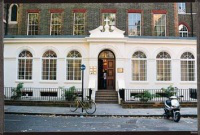London: Heythrop's 400th Anniversary Conference - 1

The 400th anniversary of the foundation of Heythrop College was marked yesterday by a prestigious international academic event presented in collaboration with the Institute of English Studies at the University of London. For the Greater Glory of God and the Common Good: the Jesuit educational tradition was hosted at the imposing Senate House – formerly the Ministry of Information.
Fr Michael Holman SJ opened the conference, reminding delegates that the Jesuits operated “arguably the largest education network worldwide”. Heythrop itself is the longest established Jesuit education institute in the word.
The first lecture was given by Prof Maurice Whitehead of Swansea University and described the history of the college from its establishment in Louvain 1614, to its flight to Stonyhurst in 1794 before the advancing armies of the French revolution. It was English Jesuit Robert Jones who persuaded Superior General Acquaviva that an English College should be established. After 10 years in Louvain the College moved to the politically more secure principality of Liege under the generous patronage of the Wittelsbach family. Over the next 170 years the College became a renowned centre of culture and learning, with a resident community of up to 90 Jesuits, providing formation not just for English Jesuits, but also for lay students and secular clergy.
When the Society of Jesus was finally supressed in 1773, the English College survived at Liege under the remarkable Fr John Howard SJ – the only Jesuit institution to do so. After a negotiation Fr Howard agreed that his clergy would adopt the dress and practice of secular priests, but would retain their corporate identity. The College was awarded the status of an enduring pontifical college. So it was not strictly a Jesuit College which fled from the French invasion in 1794. But the Jesuit ethos of Ignatian spirituality had been carefully nurtured. Thanks to the vision and generosity of Thomas Weld, and after a dangerous journey, the ex-Jesuits took up residence at Stonyhurst in Lancashire and re-opened for business barely three months after abandoning Liege and most of its contents to the French.
The durability and relevance through the centuries of the Jesuit ethos of educating the whole person was a recurring theme in the day’s other lectures.
Professor Kathleen Comerford of Georgia Southern University discussed how Heythrop’s library (known as the finest theological library in the UK with 180,000 volumes) developed from the sixteenth century and how it compared to other Jesuit libraries around the world.
Dr Robert Maryks of Boston College discussed the impact of classical literature on Jesuit education. He argued that as itinerant preachers and confessors, the first companions were not primarily concerned with education and establishing institutions. But within a generation this had changed as the Society went “where the need was greatest” and adopted education as its principal ministry. Jesuits began to absorb and then to lead Renaissance humanist values, and reappraise “pagan” classical texts. In particular Cicero’s emphasis on the need for education to be purposeful and task-orientated became very important to the Jesuit curriculum. Rhetoric as a tool for success in almost any field – civic, political, military, and evangelisation – was a foundation stone of Jesuit education borrowed from Cicero. Jesuits became among the most accomplished Latinists in Europe.
This theme was developed by Professor Nicholas Sagovsky of Roehampton University, who entranced the delegates with his accomplished readings of the complex meter of Gerard Manley Hopkins SJ, Heythrop’s most famous alumnus, and an accomplished classical scholar. His theme was the poet as theologian, and he explained how Manley-Hopkins’ theology was as advanced for its time, as his poetry.
Dr Guy Consolmagno SJ of the Vatican Observatory gave an overview of the Jesuits and Science, through four centuries and across all continents. Jesuits shone in the field of scientific exploration because of their comprehensive liberal education, because of their training in rhetoric and communication, because they travelled the globe before anyone else did, and because they had an international network of collaborators. Achievements which stood out were developments of methodologies for measurement of the earth’s core (James Macelwane SJ) and – space! (Angelo Secchi SJ)
Professor John Haldane of St Andrew’s University gave a fascinating overview of the Jesuit contribution to philosophy from the late sixteenth century. He named at least a dozen eminent philosophers educated by Jesuits. He referred to the first annotation of the St Ignatius’ Spiritual Exercises and suggested that Jesuits saw philosophy as “an ornament to a rational nature” and a tool for “guidance towards a just end”.
The day ended with the Hilda Hulme Memorial Lecture given by Professor Dayton Haskin of Boston College who spoke eloquently about John Donne and Ignatian Spirituality. Although an eminent protestant clergyman, Donne’s uncles were both Jesuits, and his mother remained a Catholic. Professor Haskin showed how the structure and wisdom of the spiritual exercises of St Ignatius are present in Donne’s sonnets and sermons.















